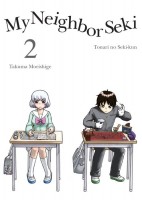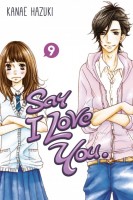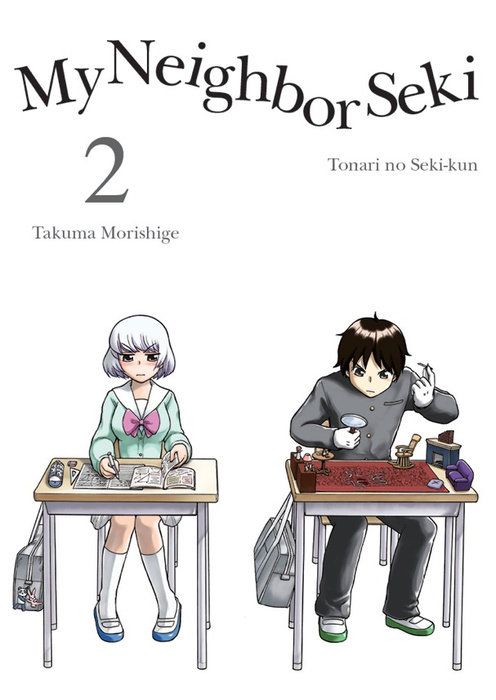My News and Reviews
Only one review was posted at Experiments in Manga last week since I’m still on my more relaxed blogging schedule. I’m a little behind in reviewing the series, but I finally took a closer look at What Did You Eat Yesterday?, Volume 8 by Fumi Yoshinaga. I’m still really loving the manga, especially the realistic portrayal of its characters and their relationships. The eighth volume had some heartbreaking moments as well as heartwarming moments and just the right touch of humor to keep it all entertaining.
I came across quite a few interesting things to read online last week. Organization Anti-Social Geniuses has a great post about the skills and education that are helpful for pursuing a career in the manga publishing industry. The Guardian looks at some recent and past manga controversies in the article “Manga rows show why it’s still Japan’s medium of protest.” Also of note, Dark Horse, partnering with Le Vision, will apparently be adapting six Chinese comics into English. Compared to manga or even manhwa, hardly any manhua has been published in English; there is only one other publisher that I know of off the top of my head (JR Comics) which is currently releasing manhua in translation.
Elsewhere online, Manhattan Digest interviewed Graham Kolbeins, talking about gay manga, MASSIVE, and the group’s hopes to expand into more queer content, which is very exciting. Wondering about the state of the English edition of Takako Shimura’s Wandering Son? Crunchyroll gathered together some of the comments made by Matt Thorn (the series’ translator) about the manga’s current status. Sadly, it’s not especially encouraging. Although Fantagraphics has stated in the past that it intends to release the entire series, the publication date for ninth and next volume has yet to be set. Fantagraphics is still working on manga projects, though–Moto Hagio’s Otherworld Barbara should hopefully be released sometime in 2016.
Quick Takes
 My Neighbor Seki, Volumes 2-4 by Takuma Morishige. I continue to be utterly charmed and delighted by My Neighbor Seki. The anime series was wonderful, too, but I’m especially glad for the chance to read the chapters that where never adapted. My Neighbor Seki is an episodic manga, but there are a few running jokes that have emerged. Several scenarios feature the robot family, for one; Seki’s younger sister repeatedly appears after being introduced; and Yokoi and Seki’s classmate Goto more than once erroneously believes their relationship to be of a romantic nature. And of course there is the primary gag that underlies the entire series: Seki goofing off in class in impressively ridiculous ways and Yokoi being completely caught up in it all despite herself. My Neighbor Seki is marvelously funny and imaginative. Seki’s antics and Yokoi’s reactions (and overreactions) to them never disappoint. Reading the manga always leaves me smiling and has even been known to make me laugh out loud. I’m very glad that Vertical ultimately decided to release the entire series rather than just a “best of” collection.
My Neighbor Seki, Volumes 2-4 by Takuma Morishige. I continue to be utterly charmed and delighted by My Neighbor Seki. The anime series was wonderful, too, but I’m especially glad for the chance to read the chapters that where never adapted. My Neighbor Seki is an episodic manga, but there are a few running jokes that have emerged. Several scenarios feature the robot family, for one; Seki’s younger sister repeatedly appears after being introduced; and Yokoi and Seki’s classmate Goto more than once erroneously believes their relationship to be of a romantic nature. And of course there is the primary gag that underlies the entire series: Seki goofing off in class in impressively ridiculous ways and Yokoi being completely caught up in it all despite herself. My Neighbor Seki is marvelously funny and imaginative. Seki’s antics and Yokoi’s reactions (and overreactions) to them never disappoint. Reading the manga always leaves me smiling and has even been known to make me laugh out loud. I’m very glad that Vertical ultimately decided to release the entire series rather than just a “best of” collection.
 One Is Enough by Love. Gen Manga is one of the very few publishers to release translations of doujinshi in English. The selections are independent, amateur works that unsurprisingly vary in quality, but I generally find them interesting. I believe One Is Enough was the first and so far has been the only boys’ love offering from Gen. I originally read the first half or so of the manga while it was being serialized, but am only now getting around to reading the completed volume. I’m not entirely sure whether it’s intentional or not, but at times One Is Enough almost seems to be a parody of boys’ love, exaggerating some of the genre’s well-worn tropes and plot devices. Although there are some nice individual panels and sequences, the manga’s artwork is sadly very inconsistent. Even the story itself seems to be constantly shifting in tone, as though the creator couldn’t quite decide which direction to take the manga. One Is Enough can be silly, cute, and sweet, but it also occasionally deals with some pretty heavy subject matter like suicide and self harm. Honestly, the manga is a bit of a mess without much cohesion, but it does have its moments.
One Is Enough by Love. Gen Manga is one of the very few publishers to release translations of doujinshi in English. The selections are independent, amateur works that unsurprisingly vary in quality, but I generally find them interesting. I believe One Is Enough was the first and so far has been the only boys’ love offering from Gen. I originally read the first half or so of the manga while it was being serialized, but am only now getting around to reading the completed volume. I’m not entirely sure whether it’s intentional or not, but at times One Is Enough almost seems to be a parody of boys’ love, exaggerating some of the genre’s well-worn tropes and plot devices. Although there are some nice individual panels and sequences, the manga’s artwork is sadly very inconsistent. Even the story itself seems to be constantly shifting in tone, as though the creator couldn’t quite decide which direction to take the manga. One Is Enough can be silly, cute, and sweet, but it also occasionally deals with some pretty heavy subject matter like suicide and self harm. Honestly, the manga is a bit of a mess without much cohesion, but it does have its moments.
 Say I Love You, Volume 9 by Kanae Hazuki. As the winners of the school idol contest, Megumi and Yamato are expected to go on a date with each other, despite the fact that he already has a girlfriend. While I had to suspend my disbelief for some of the setup, Hazuki actually handles the scenario as a whole very well. I was completely satisfied with the way that the date played out and ultimately ended. I also feel better about Megumi as she continues to mature as a person; the date was a turning point for her. Many of the characters in Say I Love You are dealing with some very personal issues, but there is hope that they will be okay in the end even though the journey itself may be painful. After the date and its fallout has been resolved, most of the ninth volume is actually spent exploring the tragic backstory of Yamato’s brother Daichi and how it complicates and interferes with his present-day relationships. Hazuki promises to return to Mei and Yamato’s story which will be good to see, but one of the things I particularly like about Say I Love You is Hazuki’s willingness to take the time to delve into the lives of the other characters as well.
Say I Love You, Volume 9 by Kanae Hazuki. As the winners of the school idol contest, Megumi and Yamato are expected to go on a date with each other, despite the fact that he already has a girlfriend. While I had to suspend my disbelief for some of the setup, Hazuki actually handles the scenario as a whole very well. I was completely satisfied with the way that the date played out and ultimately ended. I also feel better about Megumi as she continues to mature as a person; the date was a turning point for her. Many of the characters in Say I Love You are dealing with some very personal issues, but there is hope that they will be okay in the end even though the journey itself may be painful. After the date and its fallout has been resolved, most of the ninth volume is actually spent exploring the tragic backstory of Yamato’s brother Daichi and how it complicates and interferes with his present-day relationships. Hazuki promises to return to Mei and Yamato’s story which will be good to see, but one of the things I particularly like about Say I Love You is Hazuki’s willingness to take the time to delve into the lives of the other characters as well.

Thank you for mentioning that “article” on Wandering Son’s status. I will be seriously depressed if Fanta drops it. They have never struck me as a company that’s hurting for funds but I guess it’s possible (How many publishers have their own brick and mortar store?). Now that they’ve put out half the series, if there hasn’t been an issue with the license on the Enterbrain side…couldn’t they do just do another major event at TCAF to draw interest back to it? As someone who’s read almost the full series in Japanese, I would have to say it only really gets better from this point. ;(
Well, seeing as Fantagraphics needed to resort to a Kickstarter not so long ago to help fund a season, I wouldn’t assume the publisher has a huge profit margin; although respected, Fantagraphics is a specialty publisher in an already niche market.
I really hope the rest of Wandering Son is able to be published in English, though. I’ll happily buy the Japanese edition, but the series is personally very important to me and Fantagraphics’ release is lovely.
My Neighbor Seki really is something special. I’m usually more into Berserk, Gantz, Eden etc darkness. Lately though I’ve been enjoying Seki, Satamoto, Barakamon. Its a nice counterbalance.
I’m right there with ya! Berserk is one of my all-time favorites, and I really enjoy darker stories, but there’s just something wonderful about the comedy and gag manga being released recently. :)
Yeah, I was thinking about this recently, the great comedy series we’ve had the last year or so. Has the american market tastes shifted a little or something? I was trying to think of good comedy series released earlier and drew a blank. The only thing that comes to mind is Yotsuba.